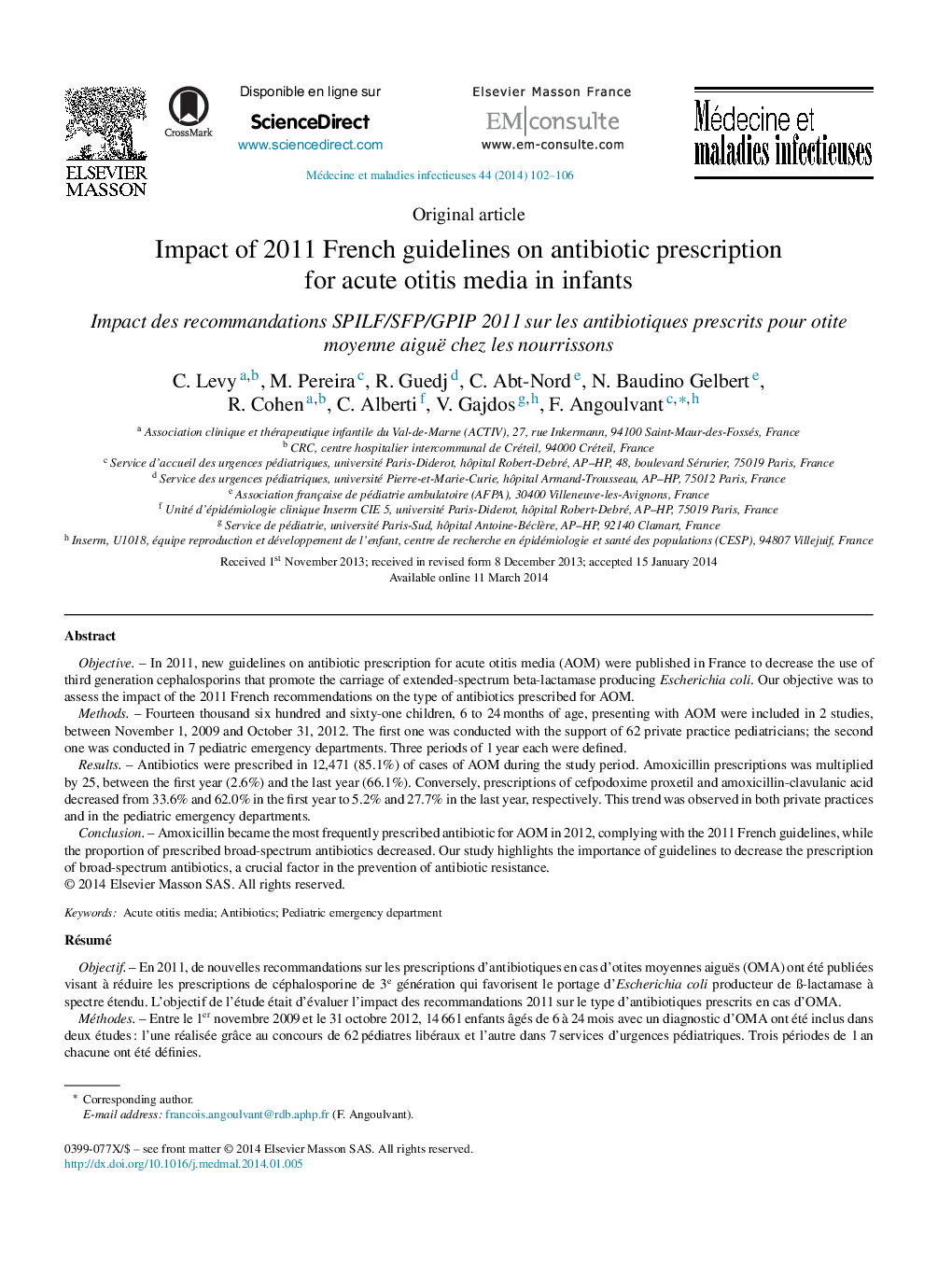| کد مقاله | کد نشریه | سال انتشار | مقاله انگلیسی | نسخه تمام متن |
|---|---|---|---|---|
| 3412637 | 1224239 | 2014 | 5 صفحه PDF | دانلود رایگان |
ObjectiveIn 2011, new guidelines on antibiotic prescription for acute otitis media (AOM) were published in France to decrease the use of third generation cephalosporins that promote the carriage of extended-spectrum beta-lactamase producing Escherichia coli. Our objective was to assess the impact of the 2011 French recommendations on the type of antibiotics prescribed for AOM.MethodsFourteen thousand six hundred and sixty-one children, 6 to 24 months of age, presenting with AOM were included in 2 studies, between November 1, 2009 and October 31, 2012. The first one was conducted with the support of 62 private practice pediatricians; the second one was conducted in 7 pediatric emergency departments. Three periods of 1 year each were defined.ResultsAntibiotics were prescribed in 12,471 (85.1%) of cases of AOM during the study period. Amoxicillin prescriptions was multiplied by 25, between the first year (2.6%) and the last year (66.1%). Conversely, prescriptions of cefpodoxime proxetil and amoxicillin-clavulanic acid decreased from 33.6% and 62.0% in the first year to 5.2% and 27.7% in the last year, respectively. This trend was observed in both private practices and in the pediatric emergency departments.ConclusionAmoxicillin became the most frequently prescribed antibiotic for AOM in 2012, complying with the 2011 French guidelines, while the proportion of prescribed broad-spectrum antibiotics decreased. Our study highlights the importance of guidelines to decrease the prescription of broad-spectrum antibiotics, a crucial factor in the prevention of antibiotic resistance.
RésuméObjectifEn 2011, de nouvelles recommandations sur les prescriptions d’antibiotiques en cas d’otites moyennes aiguës (OMA) ont été publiées visant à réduire les prescriptions de céphalosporine de 3e génération qui favorisent le portage d’Escherichia coli producteur de ß-lactamase à spectre étendu. L’objectif de l’étude était d’évaluer l’impact des recommandations 2011 sur le type d’antibiotiques prescrits en cas d’OMA.MéthodesEntre le 1er novembre 2009 et le 31 octobre 2012, 14 661 enfants âgés de 6 à 24 mois avec un diagnostic d’OMA ont été inclus dans deux études : l’une réalisée grâce au concours de 62 pédiatres libéraux et l’autre dans 7 services d’urgences pédiatriques. Trois périodes de 1 an chacune ont été définies.RésultatsDes antibiotiques ont été prescrits dans 12 471 (85,1 %) des cas. La part de l’amoxicilline a été multipliée par 25 entre la première année (2,6 %) et la dernière année (66,1 %). À l’inverse, les prescriptions de cefpodoxime proxétil et d’amoxicilline-acide clavulanique ont diminué passant respectivement de 33,6 % et 62,0 % la première année à 5,2 % et 27,7 % la dernière année. Cette évolution a été constatée tant chez les pédiatres libéraux que dans les services d’urgences pédiatriques.ConclusionConformément aux recommandations françaises de 2011, l’amoxicilline est devenue en 2012 le premier antibiotique prescrit en cas d’OMA tandis que la part des antibiotiques à large spectre s’est réduite. Notre étude souligne l’importance de la publication de recommandations pour lutter contre la prescription d’antibiotiques à large spectre, facteur crucial dans la lutte contre la résistance bactérienne aux antibiotiques.
Journal: Médecine et Maladies Infectieuses - Volume 44, Issue 3, March 2014, Pages 102–106
